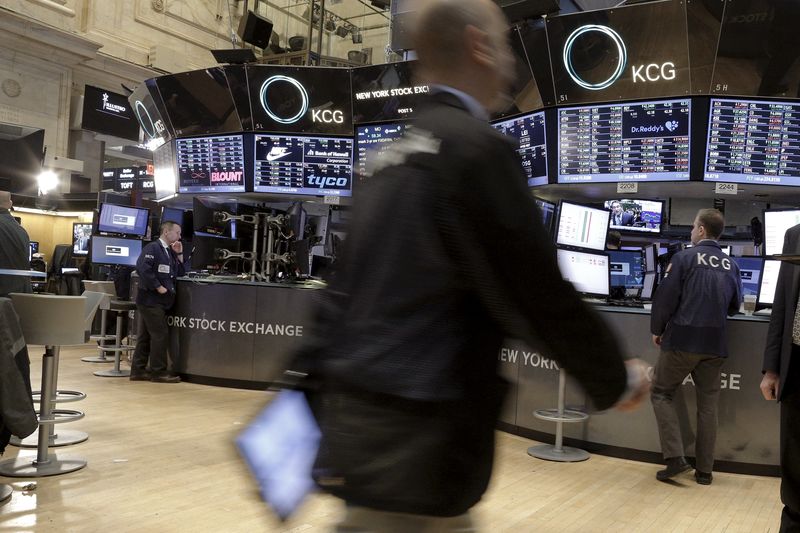This post was originally published on this site
https://i-invdn-com.akamaized.net/news/LYNXNPEC0R108_M.jpg
Investing.com — ADP gives a foretaste of Friday’s jobs report, while more Fed speakers get to talk about the central bank’s strategy shift. Treasury Secretary Steven Mnuchin rejects the latest Democratic proposal economic stimulus. The ECB starts to fret about the euro exchange rate. Australia’s run of 30 years without a recession ends and oil prices are well bid in advance of the government’s inventory data. Here’s what you need to know in financial markets on Wednesday, September 2nd.
1. ADP’s taster for August jobs report
The U.S. economy is center stage again as payrolls processor ADP publishes its estimate for the number of private-sector jobs created in August.
Consensus forecasts are for an increase of 957,000, a strong acceleration from 167,000 in July, thanks to the fading of the second wave of Covid-19 cases across the south and west of the country. However, that would still leave the economy some 12 million jobs shy of its pre-Covid level, with barely two months to go to the election.
The ADP numbers are due at 8:15 AM ET (1215 GMT). They’ll be followed by factory orders data for July at 10 AM and the Federal Reserve’s Beige book survey of the U.S. economy at 2 PM.
2. Mnuchin knock back Pelosi’s stimulus gambit
Three more speakers from the Federal Reserve get to say their peace on the U.S. economy, with NY Fed President John Williams (NYSE:WMB) due at 10 AM ET, Cleveland Fed President Loretta Mester due at 12 PM and the Minnesota Fed’s Neal Kashkari due at 2 PM.
Markets will watch closely for any reaction to the continued failure of politicians to break the deadlock over the next round of economic support measures for the U.S. economy.
Treasury Secretary Steven Mnuchin last night rejected a pared-down $2.2 trillion proposal from House Speaker Nancy Pelosi, who said “serious differences” remain between the two sides.
The Centers for Disease Control moved to neutralize one of the biggest risks to consumer confidence on Tuesday, issuing a nationwide order temporarily halting millions of U.S. renters from being evicted, saying evictions would hasten the spread of Covid-19.
3. Stocks set to open higher
U.S. stocks are set to open higher again, supported by the fact that at least politicians are talking again about a fresh stimulus package. Signs from prediction markets that Donald Trump’s chances of re-election are improving also appear to be supporting sentiment.
By 6:30 AM ET (1030 GMT), the Dow 30 futures contract was up 188 points or 0.7%, while the S&P 500 futures contract was up in parallel. Nasdaq 100 futures were up another 1.0%, amid reports of price action being increasingly driven by relatively small-scale action in the options markets by retail traders.
Of note to investors in distressed stocks – Macy’s is due to report earnings before the open. A net loss of $1.80 a share is expected. AT&T may also garner interest after The Wall Street Journal reported that it’s looking at selling its Xandr digital ad business, only days after a similar report saying that its DirecTV unit may also be on the block.
4. Australia runs out of luck; ECB frets about the euro
Australia – ‘The Lucky Country’ – finally ran out of luck in the second quarter of 2020, confirming its first recession in over 30 years.
The country’s economy shrank by 7.0% in the three months through June as Chinese demand for its commodities – notably iron ore and coal to feed its steel mills – collapsed. Australia has ridden a wave of rising Chinese commodity demand for three decades.
The slowdown hasn’t stopped the Australian dollar rising, however. It’s up 29% from its March low against the greenback and fell only 0.4% on the data to leave it close to a two-year high.
European data overnight also tended to the negative side: Spanish unemployment rose by nearly 30,000 in August, instead of the 10,000 expected, while German retail sales fell for the second month in a row in July. The euro gave up over a cent against the dollar, with comments from ECB Chief Economist Philip Lane helping to reinforce a bit of overdue profit-taking.
5. Inventories keep oil well supported
The U.S. government will release its weekly estimate of U.S. oil supplies, a day after the American Petroleum Institute suggested that last week saw another sharp drop in crude stocks.
Crude stocks are estimated to have fallen 1.89 million barrels last week while gasoline stocks are expected to have dropped by 3.04 million, with retailers having to draw down stocks to replace supplies from refineries that closed during the onset of Hurricane Laura.
The API on Tuesday had estimated a draw of 6.36 million barrels of crude, something that kept both U.S. futures and Brent well supported. They were up by 0.3% and 0.2% respectively by 6:30 AM ET.

